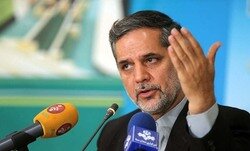Key Majlis committee passes four anti-U.S. motions

TEHRAN – The spokesman of the Majlis National Security and Foreign Policy Committee says the committee has passed four anti-American motions to counter the United States’ anti-human rights measures.
Hossein Naqavi Hosseini said on Tuesday the motions were passed during a session of the committee earlier in the day, Mehr reported.
According to Naqavi Hosseini, the motions necessitate replacing American products and services, establishing a museum on U.S. crimes, urging the government to file charges against the U.S. for its anti-human rights measures against Iranian nationals and urging the government to include the crimes committed by the U.S. in school and university books.
The top MP also said Foreign Minister Mohammad Javad Zarif has briefed the committee on his recent trip to New York to attend the UN General Assembly’s annual summit.
“According to the foreign minister’s report, in spite of the tight restrictions that the U.S. imposed on the Iranian delegation, the foreign minister held 70 meetings and speeches and the president held 40 meetings and speeches,” he explained.
President Hassan Rouhani visited New York last month to participate in the 71st annual session of the United Nations General Assembly and hold talks with senior officials of some other countries attending the meeting.
Zarif accompanied Rouhani in order to pursue Iran’s active diplomacy in face of U.S. pressure.
Back in July, the United States imposed tight travel restrictions on Zarif before a visit that month to the United Nations, as well as on Iranian diplomats and their families living in New York, which Zarif described as “basically inhuman.”
Unless they receive prior approval from Washington, they are only allowed to travel within a small area of Manhattan, Queens and to and from John F. Kennedy airport.
Tensions between Tehran and Washington have been high since U.S. President Donald Trump pulled out of the 2015 nuclear deal last year and re-imposed sanctions on all major industries in Iran, including oil and petrochemicals exports.
The U.S. has since been adopting a “maximum pressure” policy in order to force Tehran into entering a new round of negotiations.
Iran, however, has ruled out the possibility of talks as long as sanctions are in place, saying Washington’s “maximum pressure” has produced “maximum resistance” from Tehran.
Tehran has also described the sanctions as an act of “economic war” and “economic terrorism” against the Iranian nation.
MH/PA
